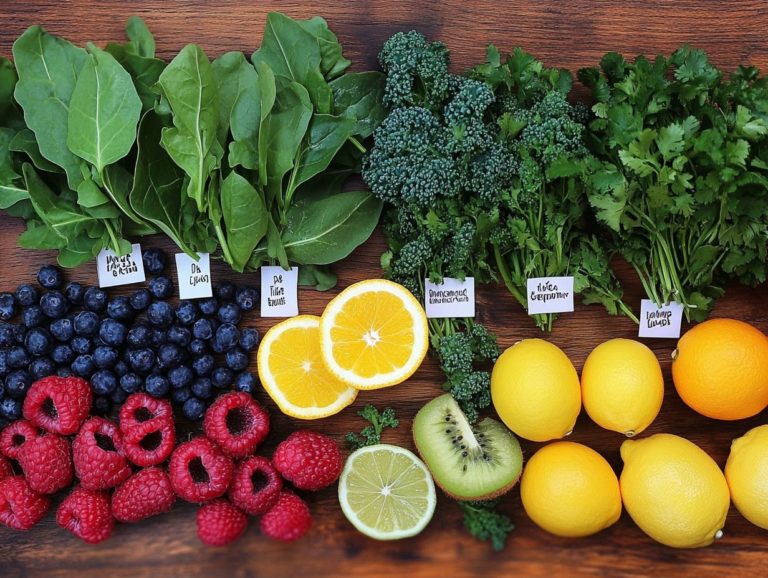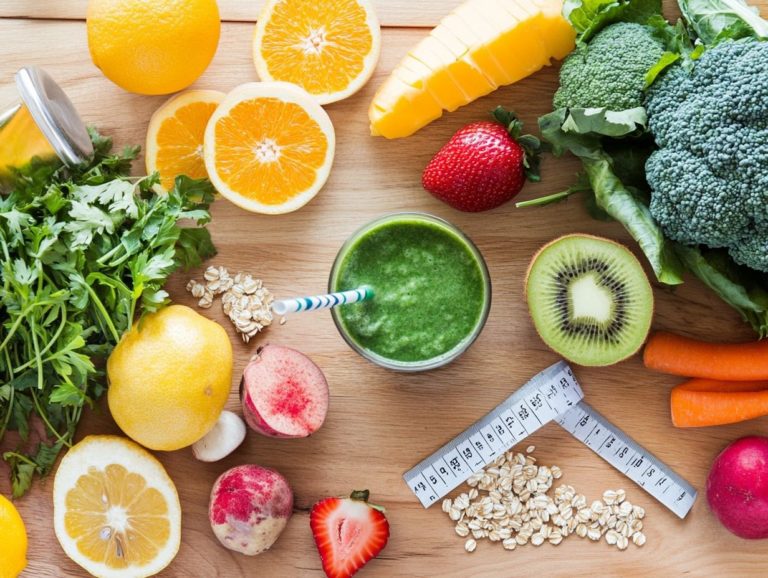Understanding the Importance of Hydration
Hydration is often underestimated. It is essential for your overall health and well-being.
Your body needs water to function properly. This affects everything from physical performance to mental clarity.
This article explores the significance of staying hydrated, highlights key signs of dehydration, and outlines how much water you should consume based on your unique needs. You ll also discover practical tips and enjoyable hydrating foods to help maintain optimal hydration levels and minimize health risks.
Explore how simple adjustments can elevate your health!
Contents
- Key Takeaways:
- The Role of Hydration in the Body
- Signs of Dehydration
- How Much Water Should You Drink?
- Tips for Staying Hydrated
- Hydrating Foods and Drinks
- Frequently Asked Questions
- What is hydration and why is it important for our bodies?
- How much water should I be drinking each day?
- What are the signs of dehydration and how can I prevent it?
- How does hydration affect my overall health?
- Is it possible to drink too much water?
- Are there any health conditions that can affect hydration levels?
Key Takeaways:
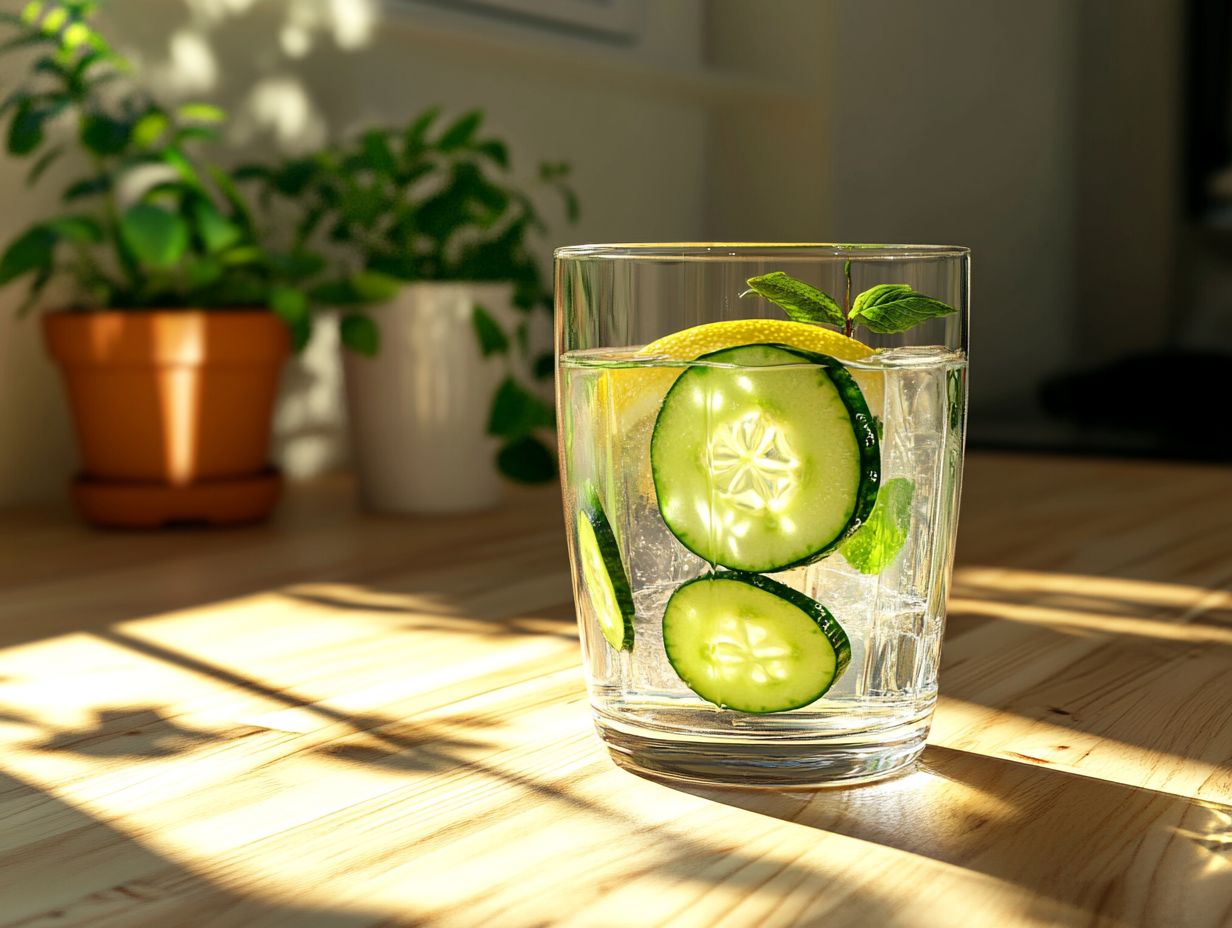
- Proper hydration plays a critical role in maintaining overall health and bodily functions. It helps keep your body temperature steady, flush out toxins, and aids digestion and nutrient absorption, ultimately preventing dehydration.
- Dehydration can cause physical and cognitive symptoms, such as thirst, dry mouth, fatigue, and difficulty concentrating. Recognizing these signs is crucial as it reminds us to listen to our body’s signals and stay hydrated throughout the day.
- The amount of water each person needs varies based on age, weight, physical activity, and climate. While it is often recommended to drink eight glasses of water a day, individual hydration needs may differ.
The Role of Hydration in the Body
Hydration is essential for maintaining optimal body function. It impacts everything from keeping your body temperature steady to preventing dehydration and its associated health risks.
Your body, composed of about 60% water, relies on adequate fluid intake to ensure all body functions run smoothly. Drinking water supports vital bodily functions, enhances cognitive performance, lubricates joints, and maintains the delicate balance of body fluids crucial for overall health.
Recognizing the importance of daily water intake empowers you to make informed choices about your hydration needs.
Why is Hydration Important?
Hydration is vital for maintaining health and well-being. It affects numerous bodily functions and helps prevent a range of health risks, including cognitive decline and chronic diseases.
When you keep your body adequately hydrated, you support optimal cognitive function, enhancing your focus, memory, and overall mental clarity. On the flip side, dehydration can diminish attention span and increase irritability, negatively impacting mood and productivity.
Ensuring sufficient fluid intake is crucial for regulating bodily processes like metabolism and circulation, both of which are essential in warding off chronic diseases such as diabetes and heart failure.
By cultivating a well-hydrated state, you not only achieve a balance critical for physical health but also foster emotional stability and resilience against stressors that can undermine your overall wellness.
Signs of Dehydration
Recognizing the signs of dehydration is essential for maintaining optimal health and well-being. Failing to do so can lead to serious health implications.
Common symptoms of dehydration, such as dry mouth, fatigue, headaches, and dark urine, serve as vital indicators that your body needs more fluids. These signs can appear in individuals of all ages adults, children, pregnant women, and the elderly underscoring the universal necessity of staying adequately hydrated.
By understanding these symptoms, you can take proactive steps to enhance your hydration status and mitigate potential health risks.
Physical and Cognitive Indicators
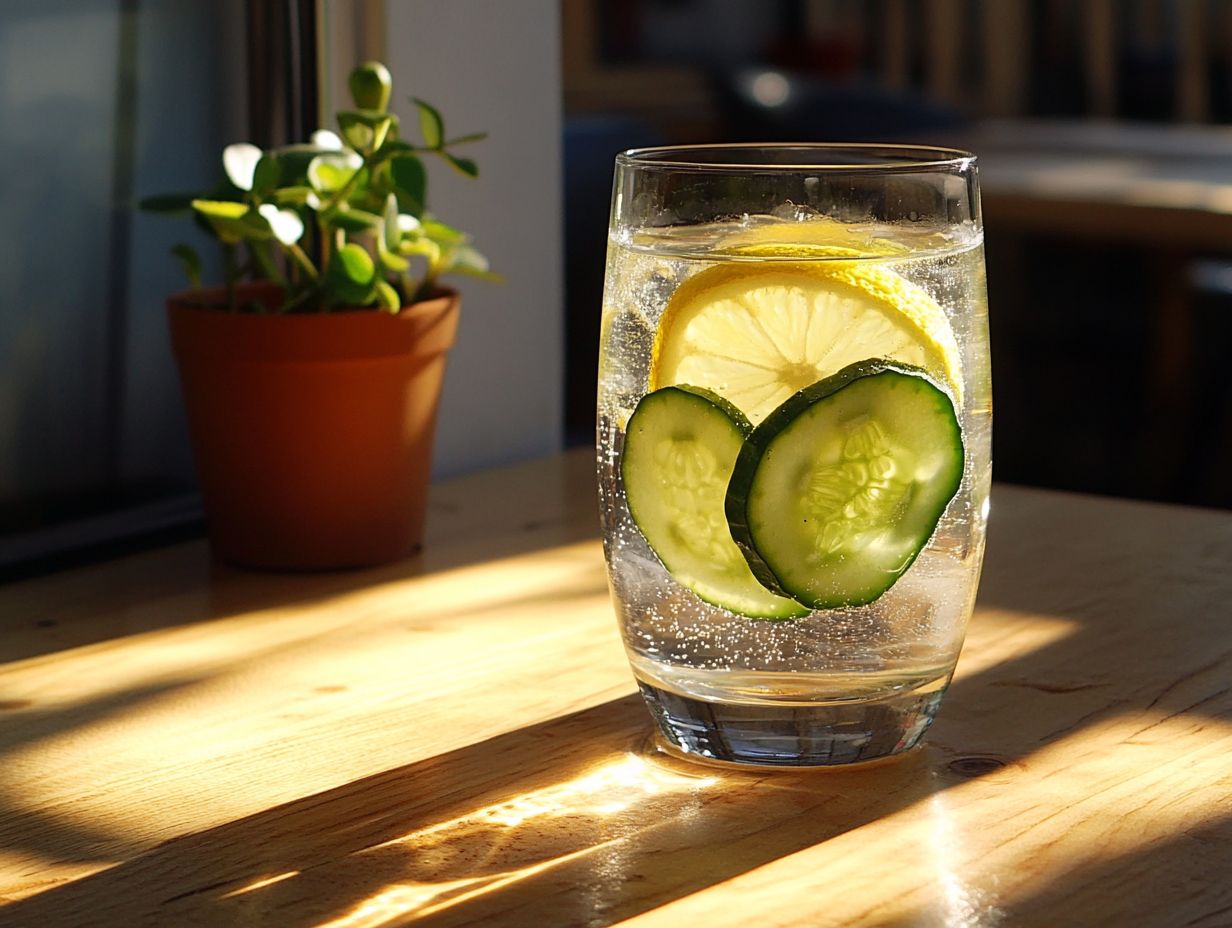
Dehydration can show up in both physical and thinking abilities, with symptoms that range from mere discomfort to significant impairment in your mental faculties. This highlights just how crucial it is to stay hydrated.
You might find yourself feeling fatigued, making even the simplest tasks feel like climbing a mountain. Dizziness can creep in, complicating your daily routine.
Muscle cramps serve as a clear signal that your body is craving fluids. On the cognitive front, reduced focus and impaired memory can leave you feeling like you re wading through a fog, which certainly doesn t help your productivity.
Recognizing these signs is vital. Keep a water bottle by your side and set reminders to sip throughout the day; it can make a world of difference.
You can also eat foods that have a lot of water in them, like cucumbers and watermelon, which can significantly boost your hydration levels, ensuring you feel your best.
How Much Water Should You Drink?
Determining the optimal amount of water to drink is essential for maintaining hydration. It s important to recognize that recommended intake can fluctuate based on various factors, such as age, activity level, and environmental conditions.
Generally, adults are advised to target around 2.7 liters for women and 3.7 liters for men, which includes all fluid sources from beverages to food. Additionally, factors like exercise intensity, temperature, and individual health considerations play a crucial role in hydration needs.
By understanding these details, you can customize your water intake to align with your personal hydration requirements.
Factors Affecting Hydration Needs
Your hydration needs are influenced by various factors, including your activity level and environmental conditions. These elements can drastically alter how much fluid you really need.
For example, when you engage in intense physical activity, especially in hot and humid environments, your body can lose a significant amount of moisture through sweat. This calls for a higher fluid intake to maintain balance.
Particularly if you re pregnant or managing chronic health conditions, your hydration needs can vary greatly. The type of fluids you choose also matters.
While water is crucial, the nutritional benefits of sports drinks and the high sugar content in sugary beverages can impact your hydration strategy. Understanding these nuances is essential for optimizing your fluid intake to suit your unique situation.
Tips for Staying Hydrated
Staying hydrated is vital for your overall health and well-being. Employing practical strategies can make it easier to maintain optimal fluid intake throughout the day.
Consider carrying a reusable water bottle with you and integrating hydration reminders into your daily routine. Opt for healthier beverages like water instead of sugary drinks or energy drinks.
You can also eat foods with high water content, such as fruits and vegetables, which can significantly enhance your daily fluid intake. Understanding the importance of hydration in detoxification can further boost your efforts. By implementing these strategies, you can take charge of your hydration and feel fantastic every day!
Practical Strategies for Maintaining Hydration

Implementing effective hydration strategies can significantly boost your fluid intake and help you meet your daily water requirements. Set clear hydration goals to track your daily water consumption.
Utilizing mobile apps or setting reminders on your devices can be incredibly helpful, gently nudging you to drink water at regular intervals throughout the day. Additionally, understanding the neuroscience of relaxation can enhance your overall well-being. Keeping an eye on your urine color offers a straightforward yet effective way to monitor your hydration levels.
A light yellow hue typically indicates that you’re well-hydrated, while darker shades may suggest it’s time to up your fluid intake. By combining these approaches, maintaining proper hydration becomes a manageable and vital part of your daily wellness routine. Understanding the importance of relaxation can also enhance this journey. Don’t wait; start your hydration journey today!
Hydrating Foods and Drinks
Incorporating hydrating foods and beverages into your diet is a delightful approach to fulfilling your fluid intake requirements while elevating your nutrition.
Foods like cucumbers, watermelon, and oranges not only offer refreshing hydration but also pack a punch of important vitamins and minerals.
Wholesome drinks such as herbal teas and infused water replace sugary sodas and energy drinks. By prioritizing these hydrating options, you can enhance your overall health and effectively support your body s hydration needs.
Nutrient-Dense Options for Hydration
Selecting nutrient-dense options for hydration is crucial in ensuring your body receives both fluids and essential nutrients that promote your overall health and well-being.
Incorporating hydration-rich foods like watermelon, cucumber, and oranges into your diet can significantly boost your fluid intake while supplying vital vitamins and minerals.
Take watermelon, for instance; it contains over 90% water and is packed with antioxidants like lycopene that may enhance heart health. Cucumber hydrates with its refreshing crunch and also delivers valuable electrolytes (minerals that help maintain fluid balance).
Consider flavored herbal teas and coconut water as excellent beverages for maintaining hydration without the burden of added sugars. These options underscore the importance of pairing hydration with nutritional value, ultimately paving the way for better health outcomes.
Frequently Asked Questions
What is hydration and why is it important for our bodies?
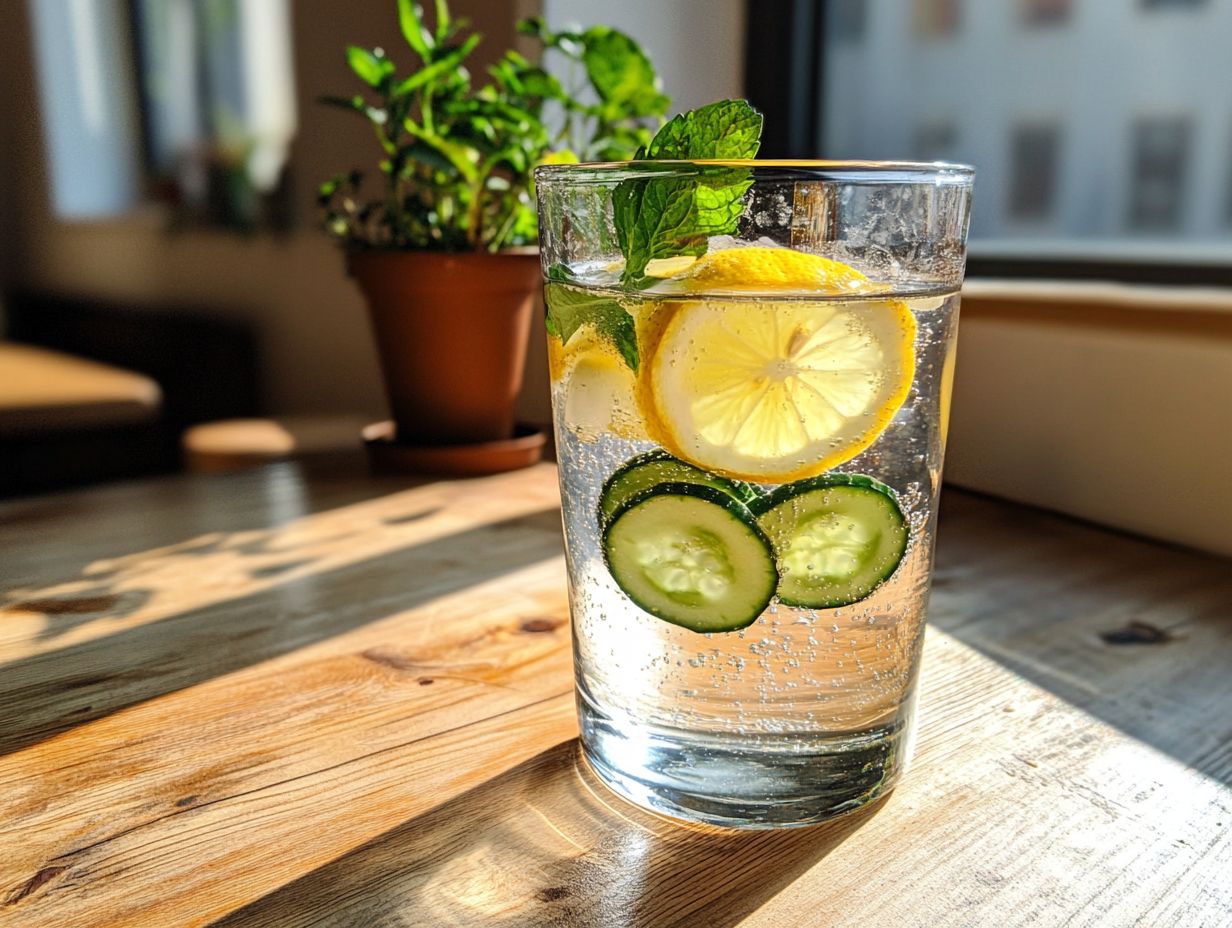
Hydration refers to the process of providing our bodies with enough fluid, usually water, to function properly. It is essential for maintaining a range of bodily functions, such as regulating body temperature, transporting nutrients and oxygen to cells, and removing waste products.
Maintaining adequate water intake is crucial for overall nutrition and preventing chronic diseases, which can be exacerbated by factors such as diabetes and heart failure. Incorporating practices like understanding the relaxation response can also contribute to better health.
How much water should I be drinking each day?
The amount of water needed varies from person to person and depends on factors such as age, gender, activity level, and climate. The general recommendation is to drink eight 8-ounce glasses of water per day, but this can vary. It is important to listen to your body and drink water when you feel thirsty.
What are the signs of dehydration and how can I prevent it?
Signs of dehydration include thirst, dry mouth, fatigue, headache, dizziness, and dark-colored urine. To prevent dehydration, it is important to drink enough water throughout the day, especially when engaging in physical activity or spending time in hot weather.
Eating foods with high water content, such as fruits and vegetables, can also help prevent dehydration.
How does hydration affect my overall health?
Proper hydration is essential for maintaining good health. It can improve digestion, boost energy levels, promote healthy skin, and help prevent a range of health issues such as constipation, kidney stones, and urinary tract infections.
Staying hydrated can also improve athletic performance and aid in weight loss. Start adding hydrating foods to your meals today!
Is it possible to drink too much water?
Staying hydrated is essential, but drinking too much water can be harmful. This condition can lead to dangerously low sodium levels in your body.
Pay attention to your body and avoid forcing excessive water intake.
Are there any health conditions that can affect hydration levels?
Health issues like diabetes and kidney disease can impact how your body regulates hydration. Individuals with these conditions should work closely with healthcare providers to maintain proper hydration and manage potential complications.




